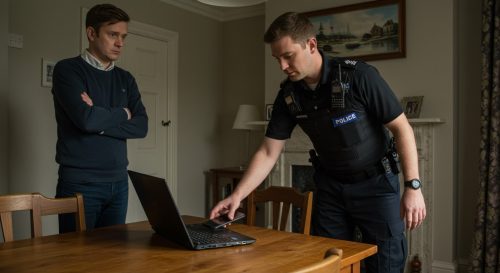Navigating the Seizure of Electronic Devices by Police: Understanding the Process and Legal Recourse

Navigating the Seizure of Electronic Devices by Police: Understanding the Process and Legal Recourse
In the contemporary digital environment, electronic devices such as mobile phones, computers, and tablets are not only personal assets but also reservoirs of sensitive information. When these devices are seized by law enforcement agencies, it can be a disconcerting experience for the owner.
This detailed guide aims to elucidate the procedures followed by the police during a seizure of electronic devices, the subsequent examination of these devices, and the available legal avenues.
Understanding the Reasons for Seizure

Law enforcement authorities may confiscate electronic devices for a variety of investigative purposes. The common thread in these scenarios is the pursuit of evidence pertinent to criminal investigations.
This can include cases ranging from minor legal infractions to serious criminal offences. The police are bound by specific legal protocols, which often require judicial authorisation, such as obtaining a warrant, before proceeding with a seizure. Understanding the legal basis for such actions can offer some clarity and context to the affected individuals.
What Happens After a Seizure?
Following the seizure, the electronic device is subject to a rigorous forensic examination. This is a sophisticated process where trained professionals meticulously analyse the data stored on the device.
The scope of this analysis is comprehensive and can encompass the retrieval and examination of text messages, emails, call histories, photographs, and other digital records. This process is conducted in adherence to stringent legal standards to ensure that any evidence obtained is admissible in court and that the rights of the individual are not infringed.
Duration of the Seizure

The timeframe for which the police retain possession of a seized device is not fixed and can vary significantly. Factors influencing the duration include the complexity of the case, the volume of data to be scrutinised, and the resources available to the investigative team.
In straightforward cases, the process may be completed within a few days. However, in more intricate investigations, especially those involving extensive digital records or encryption, the analysis could extend over several weeks or even months.
Legal Recourse and Involving a Solicitor
Engaging a solicitor in the aftermath of a device seizure is a critical step. A solicitor with expertise in this field can provide invaluable guidance on the legal nuances of the seizure and the rights of the individual.
They can explain the legal justifications for the seizure, the expected timelines, and what outcomes can be anticipated. Furthermore, a solicitor can act as an intermediary between the individual and law enforcement, making inquiries about the status of the investigation and advocating for the timely return of the device.
Their involvement can be crucial in ensuring that the individual’s legal rights are upheld and that the process is conducted fairly and transparently.
Conclusion: Navigating the Seizure of Electronic Devices by Police

The confiscation of electronic devices by police is a matter that is treated with utmost seriousness and is governed by well-established legal procedures. Understanding these procedures can mitigate some of the stress and uncertainty associated with such events.
Additionally, seeking the advice and representation of a solicitor can provide reassurance and ensure that one’s legal rights are vigorously protected throughout the process.
Notice: Informational Content Disclaimer
The content provided on this website, including articles, blog posts, and other informational materials, is intended for general informational purposes only. It is not intended as, and should not be considered, legal advice.
Visitors to this website should be aware that the information presented here is not a substitute for seeking legal advice from a qualified solicitor or legal professional. Each individual's legal situation is unique, and the information provided may not be applicable to specific circumstances.
If you require legal advice or have specific legal questions, we encourage you to contact us directly. Our experienced team of solicitors is here to assist you with your legal needs and provide tailored advice to address your concerns.
Please be advised that any communication through this website, including the use of contact forms or email, does not create a solicitor-client relationship. Confidential or time-sensitive information should not be sent through this website. To establish a solicitor-client relationship and discuss your legal matters in detail, please contact us for a consultation.
We strive to provide accurate and up-to-date information, but we make no representations or warranties regarding the accuracy, completeness, or suitability of the information contained on this website. We shall not be liable for any reliance placed on the information provided herein.
Thank you for visiting our website. We look forward to the opportunity to assist you with your legal needs.




